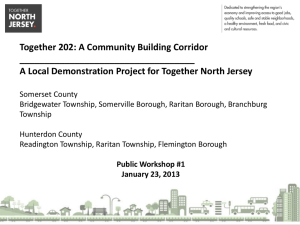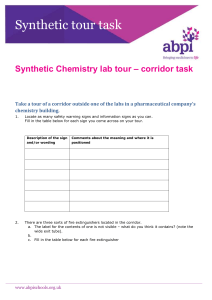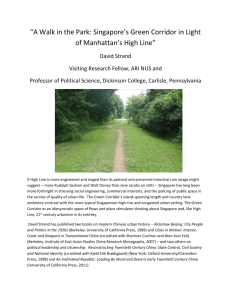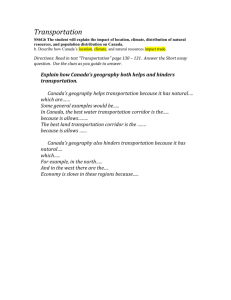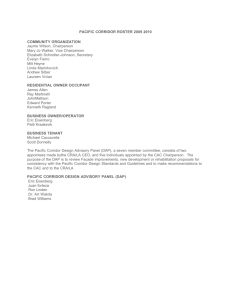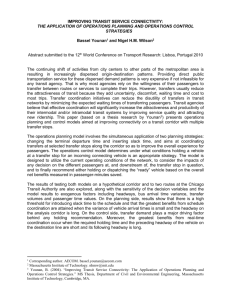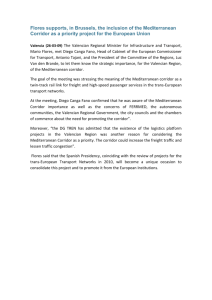Business-Roundtable-Presentation
advertisement
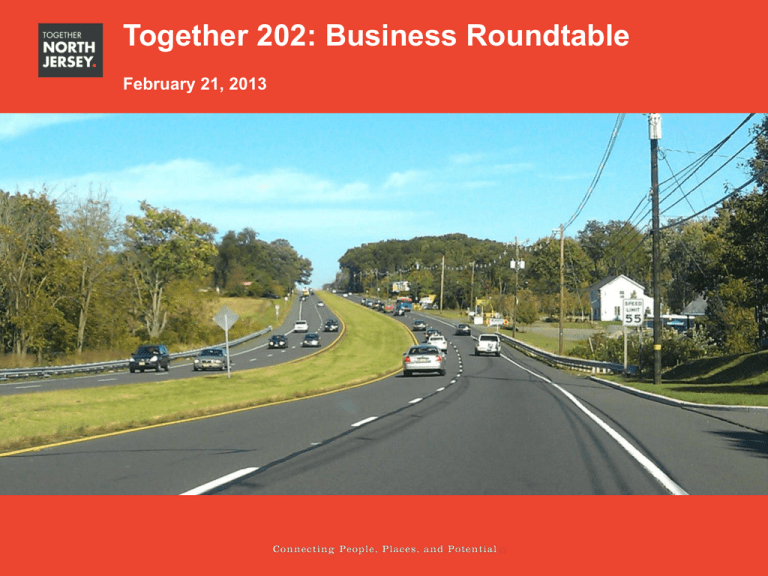
Together 202: Business Roundtable February 21, 2013 Section title Subtitle Why are we here? Why are we here? “Merck officials said the decision to consolidate in Summit rather than Readington was based on several factors, including the existing company divisions already there, the room for growth and access to major transportation hubs and New York City.” Why are we here? The loss will not only impact the local tax base, but have a spillover on other local businesses like coffee shops, bagel stores and gas stations dependent on Merck employees who now shop there. "The impact of that business leaving is a decline in the business climate around Merck headquarters," said Robert Walton, the Hunterdon County freeholder director. "All the businesses up and down Route 22." Together North Jersey What is Together North Jersey? • A planning initiative currently underway in the 13-county North Jersey Transportation Planning Authority region of New Jersey • In November 2011, the U.S. Department of Housing and Urban Development (HUD) awarded Together North Jersey a $5 million grant to develop a Regional Plan for Sustainable Development (RPSD) • Create a comprehensive and balanced plan that invests in the region’s existing communities where housing, jobs, educational, cultural, and recreational opportunities are made more easily accessible to most residents without having to drive to them What are Local Demonstration Projects? • The LDP is intended to provide technical assistance to local partners throughout Northern New Jersey to undertake strategic planning activities promoting sustainable and livable, transit-oriented development and advance the broader goals of the RPSD • Potential LDP projects include a variety of local planning activities to make transit corridors and communities more livable Project Team and Partners - Project Team: • Regional Plan Association • The Williams Group • Arup • Level G Associates - Steering Committee: • Somerset County • NORWESCAP • Somerset County Business Partnership • Hunterdon County Chamber of Commerce • Raritan Valley Community College • HART TMA • Ridewise TMA • Flemington Borough • • • • • • • • • Trans-Bridge Bus Hunterdon County Bridgewater Township Somerville Borough Raritan Borough Branchburg Township Readington Township Raritan Township NJTPA The Study Area Together 202 Mission This project proposes to: 1. Foster a working and collaborative network of interested citizens, residents, business owners, property owners, advocates and stakeholders living in the targeted communities participate in the process and support project actions and outcomes 2. Develop a deep understanding of the Route 202 Corridor, including demographic, land use, transportation and market trend analyses to understand the opportunities for growth and connectivity along the corridor 3. Develop a stakeholder-driven vision for the corridor that identifies opportunities and provides recommended strategies that link land use to business development, redevelopment and transportation enhancements Together 202 Scope & Timeline Phase I: Research & Analysis – Where are we now? Where are we headed? • Review of Master Plans, Studies and Reports • Demographic/economic profiles • Corridor Tour Phase II: Outreach & Ideas - Where do we want to go? • Focus Groups (Mayors, Transportation, Business) • Community Workshops Phase III: Implementation Strategies - How do we get there? • Corridor Vision Plan Together 202 Goals & Objectives Getting Places Expanding Economic Opportunities Connect workers, residents and employees to key employment and commercial destinations through enhanced transit Make recommendations for existing businesses to capitalize on transit/corridor improvements Together 202 Goals & Objectives Growing in Place Working Together Identify target opportunity sites for redevelopment, reinvention or repositioning Work closely with state agencies to implement recommendations Together 202 Goals & Objectives Keeping Healthy, Safe & Vibrant Find ways to improve connectivity along the corridor KEY ACCOMPLISHMENTS • Convened governmental, NGO, community, and business partners • Met with local representatives and transit officials to identify key corridor obstacles and opportunities • Completed economic and demographic analyses of corridor trends • Organized a public workshop that gathered public input and concerns KEY FINDINGS • Land uses have to change in order for there to be better connectivity and enhanced service KEY FINDINGS • Most significant growth should be concentrated in centers (Somerville, Flemington) and should capture demographic and economic trends. Centers KEY FINDINGS • There are opportunities for reinvention at the edges and should reflect demographic and economic trends. Edges KEY FINDINGS • The land uses in the middle should largely be maintained, leveraging open space and agroeconomy opportunities, while knitting together existing uses at the crossroads. Crossroads, Rural & Parkway ECONOMIC ISSUES What is the economic future of the Route 202 corridor? What investments will secure a vibrant future here? How can existing amenities be reinvented to address changing demand? Together 202: The Economic Future of the Route 202 Corridor The Williams Group Real Estate Advisors LLC February 2013 “Flemington-Somerville 202 Gateway” Crossroads Centers Transit Corridor Community Town Center • Hotel Conf. Ctr. • Mixed-Use Residential • Retail Shops/Restaurants & Market • Fitness Center to Attract Young Professionals • Parking & Sports Ctr. • Downtown Culture & History • • • • • • • • • • Pharmaceutical Green Tech Sustainability Green Energy Green and organic consumer products Bio Tech IT Health Care R&D Manufacturing Edges • • • • • Downtown Venues Gateway Tourism Historic , Adventure, Eco, Cultural ,Epicurean, Agri, Bicycle, Beer /Wine, Transit, Health & Rural Tourism Gateway to Hiking Sports Venues Historic Building Renovation Mobility • • • Parkway Rural • • • • Green space Plan Mixed-Uses connected by walking & bike trail loop New entrance to Flemington & Somerville Access to transit options • • • • • Highway Scape Seasonal Variation Tourism & Recreational Bike Trails Art in the Fields • New Transit Facility Rail Trails Separate Auto from Pedestrian Shuttle Connecting Town Centers Route 202 Corridor Executive Summary • • • • • TWG Goal is to determine how to attract new business and development to the corridor and to the towns/boroughs at the north and south ends, Flemington and Somerville. The Scope to meet the goal is to develop a regional market analysis and business attraction analysis to evaluate the corridor The approach utilized a ten (10) step screening process and scored the corridor on the screening to determine strength and weaknesses Demographic, economic, and other market data parameters were utilized to support the approach Overall the corridor scored well: – Quality of life, interstate access and educated workforce scored high for business attraction – However, there are weaknesses related to housing and transit that need to be mitigated: The fastest growing demographics—empty nesters have unmet demand in the regional urban centers at the end of the corridor Transit is not supported by current sprawl and lacks corporate support through bus stops at businesses and shopping center for example and more stop-and-rides needed Some strong tourism and lifestyle amenities are in place but need to be expanded to provide stronger corporate image attraction component Adapted from: Metrocouncil.org Route 202 Corridor Historical Perspective--Cap Rates and Property Value Route 202 Corridor Existing Conditions --Cap Rates and Property Value Route 202 Corridor Cap Rates and Property Value • • $4/SF less rent is 30% less value Recent Sales average $125/SF for I-78/I-287 sub-market Central NJ Office Cap Rate Trend 10.00% 9.00% 8.00% 7.00% 6.00% Cap rates Q3 Q2 Q1 Q4 2011 Changing Values by Attracting Business Regional Evaluation Market Assessment & SWOT Industry Targets Corridor Evaluation Market Development Potential Go-No Go Assessment Station Evaluation Market Supportable Real Estate Real Estate Opportunities for Specific Station System Wide Synergies Route 202 Corridor 10 Steps to Process for Corridor Success The Corridor 10-Step Program will be scored to high light areas of strength and opportunities for improvement: 1. Foster downtown growth to support transit and business success 2. Support health, environment and energy business sectors as growth opportunities 3. Support positive image and business attraction with linked trail system trough businesses along corridor 4. Provide incentives for businesses to embrace transit with green ribbon awards, taxes breaks and corporate support 5. Spark demographic growth by keeping older baby boomers in downtown with targeted housing 6. Attract graduating college professionals with downtown housing and amenities 7. Maintain downtown densities to support transit 8. Provide convenient intermodal connections 9. Support existing transit opportunities with park and rides, stops, assets local opportunity areas 10. Support infill development to focus on business clustering rather than sprawl Adapted from: Metrocouncil.org Route 202 Corridor Score Card Overall, the corridor scored highest for strong demographic support for businesses and intermodal connections for the workforce in place but potential for improvement and growth exist Route 202 Score Card of Attracting Business and Supporting Transit Category # Category Description 1 2 3 4 Downtown growth to support transit and business success Health, environment and energy business sectors as growth opportunities Positive image and business attraction with linked trail system trough businesses along corridor Incentives for businesses to embrace transit with green ribbon awards, taxes breaks and corporate support Score ( 5 best, 1 lowest attributes for Success) Commentary 5 Some existing clusters in place but more needs to be done to 5 incentives businesses including zoning and transit connections Businesses and transit need to work together through park and 1 rides, stops and shuttles This is very possible and attractive for corporate marketing but 2 the process needs to get started Demographic growth by keeping older baby boomers in downtown with targeted housing 5 6 7 8 9 10 5 Graduating college professionals with downtown housing and amenities This has great possibilities as long as zoning to encourage empty nester housing is encourages. More housing supports more businesses and creates efficient transit densities The potential is very strong here as long as incentives are included to encourage downtown multifamily mixed use housing to provide a product for young college graduates looking o live in a more urban environment and aging baby boomers looking to sell their large houses north and south of route 202 but stay in the same area--independent senior housing is positive for growth This can be harnessed and will supply the business workforce but targeted housing needs to be encouraged in the neighboring downtowns Downtown densities to support transit 2 3 More, more density Convenient intermodal connections 4 density residential Existing transit opportunities with park and rides, stops, assets Infill development to focus on business clustering rather than sprawl Total Score Total Maximum score Possible Add more park and rides at shopping areas, business and large Structure is existing but more corporation rom business is 1 required to make it work Areas of opportunity around Old York Road, downtowns and 3 existing business campuses 31 50 Route 202 Corridor Score Card 1. Foster downtown growth to support transit and business success • • Population: Density in the anchoring urban towns(cities) will support transit and intermodal facilities especially in Raritan. From here, connections can be made along the corridor – Residential densities need to be at least 7 to 12 units per acre along bus routes. For higher-frequency bus ways or rail service, a minimum average of 20 to 30 units per residential acre is needed. – (TMS Report—Transit Supportive Land Use) Density can be supported through multi family housing that compliments the growing demographics of aging boomers and young singles Household Income (est) over 55 years Age 21 to 24 $160,000.00 $49,000.00 Monthly Affordable Rent $4,400.00 $1,347.50 Population at 6 miles out by 2018 18000 3500 Source: TMS Report and Clarita's Demographic Snapshot Dec 2012 Route 202 Corridor Score Card 2. Support health, environment and energy business sectors as growth opportunities Route 202 Business Clusters --Health/Pharm primarily. : – Pharmaceutical examples, Janssen Pharmaceuticals Imclone Systems Lifecell Corporation Roche Ortho Mc Neil Pharm Veridex –a Johnson and Johnson Co WF Fischer –lab animal diets – Tech Verizon Delta Soft (combo health and tech) Signal Control Products (traffic control) – Health Environmental Services Energy including Green – Other Inc. Manufacturing US Bronze Powders GM Stainless Inc. Falcon Safety Products Chubb Specified Technologies—fire stopping Roche Molecular, Branchburg Route 202 Corridor Score Card 2. Support health, environment & energy business sectors as growth opportunities • It is essential that the Route 202 Corridor Enhance Its Attractiveness in the Competitive Market. In general, the Top Priorities for Attracting Businesses include: 1. Labor 2. Education 3. Quality of Life 4. Cost of doing business 5. Affordable Supply real estate market and labor pool 6. Financial Incentives Available 7. Infrastructure—utilities, internet 8. Existing Clusters 1. The corridor has strengths in the area of labor force, quality of life and existing clusters, but weaker in cost of doing businesses Route 202 Corridor Score Card 2. Support health, environment and energy business sectors as growth opportunities Many of the Things That Are High priorities to Business Attraction Can be Controlled or Mitigated as Needed to Increase Attractiveness, for example: 1. Regional Priorities: Create a Regional Development Organization to compete within New Jersey and to coordinate with State incentives 2. Environmental: Site readiness would make Route 202 move to the front of the pack in this area 3. Physical: north and south truck access as well as public transportation would substantially improve the attractiveness of the sites 4. Permitting: A streamlined and quick permit process means business can get up and running fast 5. Urban Planning and Zoning: zoning to compliment the market supportable uses 6. Economics: Theming of the Corridor to attract targeted industries 7. Education: Community College training of critical size to match businesses 8. Quality of Life: Downtown living opportunities to match market through zoning 9. Ownership: Competitively prices lots sized to meet market—all with access 10. Funding: Incentives for utility costs Route 202 Corridor Score Card 2. Support health, environment and energy business sectors as growth opportunities • • The Route 202 Corridor scores high for health/pharm and related tech. from demographics and quality of life – Highly educated – High White Collar workforce – Strong workforce skills in computer, math, life sciences and education – Strong home ownership However, scores low for empty nester housing at 19% below USA average Dr. C Steindel, Chief Economists, November 2012 NJ Economic insights Pop. 3 miles from Center 202 Pop. 6 Miles USA 30% 15.9% 3% 3.2 29.4% 15.7% 3.5 3 17.7 7.3 1.9 1.2 Employed Civilians Unemploysed White Collar note in workforce 68% 3.60% 80.3% 28% 66.50% 5.80% 62% 28% 58% 6.40% 60% 35% Arch/engineering Arts, sports and entertainment Businesses 2% 2.30% 10.2 2.5 2.1 8.3 1.8 1.9 4.7 Computers and math Education Healthcare tech Life Sciences Managements Office and Admin Support Community services Food Prep Legal Sales Professional Care Construction and maintenance farming maintenance and repair Production and transportation 4.80% 8% 5.10% 1.30% 17.3% 14.1% 0.8% 3% 2.0% 13.4% 2.1% 4.0% 0.1% 2.9% 4.6% 5.3 7.9 6.2 1.8 16.5 14 1.3 3.4 2 12.3 2.4 4.7 0.1 2.9 4.5 2.5 6.1 3.4 0.9 9.7 14 1.7 5.6 3.4 11.1 3.4 9.7 0.7 3.3 12 89% 80% 20% 85% 72% 28% 65% 61% 39% % of Population Educational Assets Collage Graduates Masters Degree or Betters Professional Degrees Doctorage Degree Employment and Workforce Housing Owned Single Family Multi family housing built Mostly built in Mostly built in 1980'a Mostly built in 1980'a 1970'aa Neilson/Clarita's/site reports 2012 Route 202 Corridor Score Card 2. Support health, environment and energy business sectors as growth opportunities Corridor Clusters : – Top growth industries in the USA are as follows: Financial Services Energy IT Services Health Services – Top Growth States are: Florida Georgia Texas and Tennessee for these sectors – Top Growth in New Jersey Environmental Services Energy including Green IT Services Health Services – Route 202 has Health /Pharmaceutical presence And Environmental Route 202 Corridor Score Card 3. Support positive image and business attraction with linked trail system through businesses along corridor – – – – – – – Delaware Raritan Canal Park—could be extended to 202 and through businesses Historic Downtown Flemington—65% of Flemington Borough is on National Register Quaint River Town images can be marketed Highlands Golf NorthLandz—model railroad --largest Fertile local farmland—sustainable local produce is attractive to many green visioned businesses Main Street Manor B&B, Flemington Route 202 Corridor Score Card 4. Provide incentives for businesses to embrace transit with green ribbon awards, taxes breaks and corporate support New Jersey Migration Survey--Summary Adaptation Top Reasons for Leaving the State Top Reasons for Staying in the State Income taxes--state and local--primarily affecting those earning over $100,00 and 1 mostly higher Quality of Life 2 Property Taxes Family reasons 3 Housing Costs Cannot sell a business 4 Corporate Taxes less costly than NYC 5 unaffordable economic climate Incentives Source: 2011 new Jersey migration Survey, Office of the Chief Economist Route 202 Corridor Score Card 5. Support Population Growth Trends – – – – New graduates (age 21-24 yrs.) and aging baby boomers over 65 are the fastest growth categories The family age group of 35 to 44 is declining The household incomes are very strong for the corridor and anchoring cities-- supporting good quality housing and services Average of the population is 5 years older than the USA suggesting decline in support for suburban housing Route 202 Corridor Score Card 6. Attract graduating college professionals with downtown housing and amenities • • • Young professionals are increasingly residing in downtown neighborhoods. …25 and 34 represented nearly 25 % of the downtown population…, up from 13 % in 1970. .. 44% of downtown residents in the sample had a bachelor’s degree or higher . Educational attainment is one of the primary drivers of a region’s income and economic growth. Younger workers are one potential source of labor for filling anticipated worker shortages created by retiring Baby Boomers. % of Population Pop. 3 miles from Center 202 Pop. 6 Miles USA 30% 15.9% 3% 3.2 29.4% 15.7% 3.5 3 17.7 7.3 1.9 1.2 Educational Assets Collage Graduates Masters Degree or Betters Professional Degrees Doctorate Degree Route 202 Corridor Score Card 7. Maintain downtown densities to support transit Average per capital retail is more than 50% higher than USA averages, at 32sf/person vs. 23sf/person in the USA • There is no overall Opportunity Gap in retail as it is $133Million in oversupply • Clothing is most oversupplied • However, based on spending, 110,000 sf of specialized retail can be supported in the downtowns • General merchandize and office is undersupplied Route 202 Corridor Score Card 7. Maintain downtown densities to support transit The existing office market is mixed for Demand. • At 25% regional vacancies are high for new construction Central NJ Office Hunterdon County Vacancy -250BPS Actual rents 23% Rents Actual Average -0.80% $23 The existing apartment market is strong for Demand. • • Rents are rising in the region at 4.6% which is well above national trends Demand for rental housing can be targeted to growing demographics of urban empty nesters Source: REIS Dec 2012 Source: Loopnet and Branchburg Route 202 Corridor Score Card 8. Provide convenient intermodal connections – Previous reports and Stakeholder interviews support enhanced stops and connections along the corridor Source: Parson Brinckerhoff Flemington Corridor Study Route 202 Corridor Score Card 9. Support existing transit opportunities with park and rides, stops, and local opportunity areas Example: Business and transit together: Translink Employer Benefits Program The Employer Benefits Program provides savings for both the employees and employer. The employee's TransLink Card is loaded monthly on a pre-tax basis, (which is about a 40% savings, implemented in the same way as a health savings account). The employer saves on payroll tax on those amounts, at 7.65%. The program is implemented seamlessly using a web-based platform. The employer cost is $3 per month per participant, which should be more than offset by the payroll tax savings. (Source: Mixed use housing with parking around intermodal Bus stops at Shopping Centers Shuttle to office parks California) Source: Flemington Corridor Transit Study by Parson Brinckerhoff Route 202 Corridor Score Card 10. Support infill development to focus on business clustering rather than sprawl – Most people do NOT travel to urban cores for work (Manhattan, Newark, Philadelphia or Trenton, for example) Corporate Sprawl has discouraged efficient transit Over 82% of both Somerset and Hunterdon Counties use single occupancy vehicles to travel to work Between 2 and 4% only use transit Work travel trips account for primary vehicular usage Route 202 Corridor Assets and Opportunities • • • • • • • • • • Clustering of health/pham. businesses Route 202 is old “freeway” Intermodal connections at Raritan Quality suburban housing stock High HH Income Strong Primary/secondary Education in Raritan Twp Strong higher educational component to population Aging population gives rise to Senior Housing opportunities Growing 21-24 age category supports young educated workforce with proper downtown housing and amenities Tourism and Amenities including : • Delaware Raritan Canal Park • Historic Downtown Flemington • Quaint River Town image • Highlands Route 202 Corridor Issues and Constraints • As a destination, distance and commute to Manhattan is longer than prime • North and South of route 202 includes significant housing but mixed sprawl with farms—lacks density along the corridor to efficiently support significant public transportation • Access to airports is limited to regionals • Significant community college presence but lacks direct access to universities except for Princeton to the south • High overall taxes compared to many other states Route 202 Corridor Going Forward • • Mitigation • Cost of business=incentives • Development around the cores=keep young labor pool Next Steps • Marketing Plan to Attract business • Zoning and Incentives to locate businesses in targeted locations • Link to transit connections improved • Zoning to discourage sprawl • Support Quality of Life by comingling nature along the 202 spine

